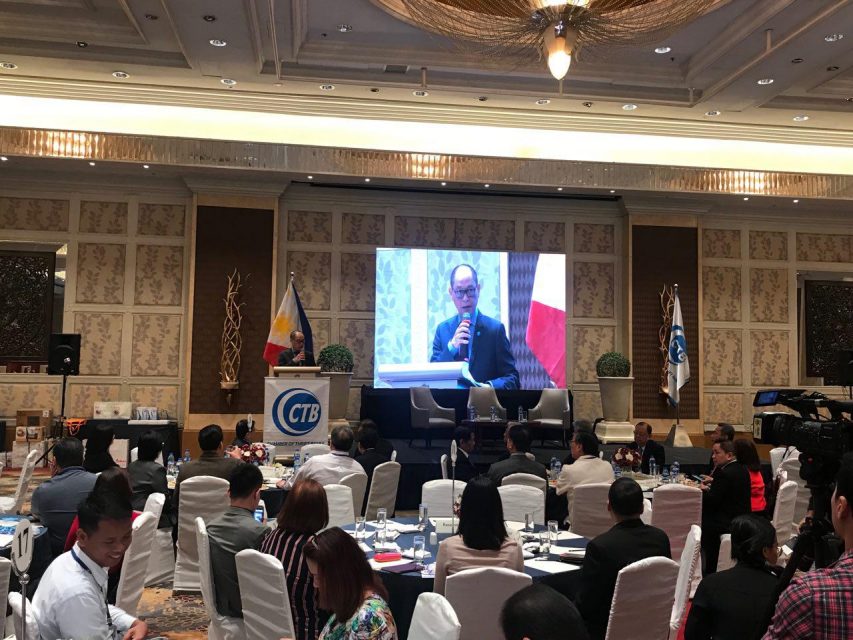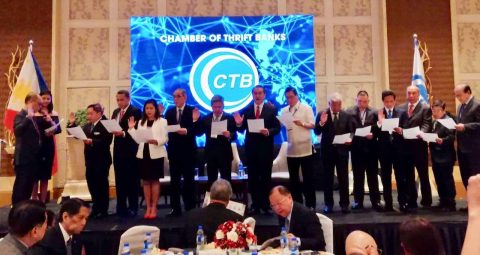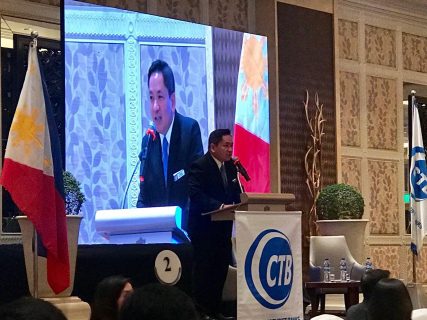
By Caesar Vallejos
OPEN FOR BUSINESS, Eagle News Service
Bangko Sentral ng Pilipinas (BSP) Governor Benjamin E. Diokno said that maintaining price and financial stability will remain the BSP’s top priority. At the Chamber of Thrift Banks (CTB) Convention held at the Makati Shangri-La last March 29, 2019, Diokno cited the Philippine economy’s recent developments, potential challenges and the BSP’s thrusts.
“You can rely on the BSP to remain independent and steadfast in safeguarding our primary mandates and implement tightly the appropriate policies that are evidence-based,” the BSP Governor said in his keynote address.
“BSP will continue to use market-based monetary instruments in its operations,” he said.
He added that “policies will be responsive to the changing demand.” The BSP Governor also mentioned some amendments to the BSP’s charter that include the restoration of the BSP’s authority to issue debt papers, and to obtain information from private individuals and entities for policy formulation.
“The law also widens the coverage of BSP’s supervised financial institutions to include money service businesses, credit card businesses and payment system operators,” he said.
He also focused on the need to support inclusive growth. “Managing these challenges also call for the BSP to go beyond convention and embark on goals outside the ambit of traditional monetary policy,” he said.
An environment must be created that is “conducive for investments and supportive of job generation and employment.”
Diokno said that BSP will push for “financial inclusion, financial education and consumer protection agenda to ensure that everybody is given the opportunity to ride in this economic growth.”
Expanding to New Markets
Themed, “Expanding to New Markets,” the CTB gathering was organized to define the plans of action while initiating next steps needed for the organization to be able to reach out to more unbanked Filipinos.
“The theme reflects the current economic financial reality that we are all facing. The global transition requires some rethinking, there is a need to focus. We need to bring our policies closer to the people and aim for longer stability and inclusive growth,” Diokno said.
“The sound and stable condition of the banking community supported to by thrift bank industry has also served as a key pillar of strength of the economy,” Diokno said.
“As of end January 2019, total resources of thrift banks rose to P1.2 trillion, a 7% increase compared to its level a year ago,” the Governor said.
Challenges

Diokno cited challenges that could potentially derail growth projection for 2019. The IMF reports that “global growth prospects in 2019 remains fragile and uneven as recovering in advanced economies is expected to remain steady while activity in emerging markets is expected to slow down,” he said.
Diokno mentioned the “emergence of the great fragmentation” brought about by the trade tensions between the US and China and the risk of great disruptions from the fourth industrial revolution as new challenges.
“While technological innovation in itself is not bad, the velocity and depth of transformation prevent potentially disruptive effects specially in the short term. Digital currencies can potentially alter the organic composition and evolution of money supply and affect how central banks can influence aggregate demand,” he explained.
Other challenges include the impact of adverse weather disturbances, infrastructure gaps, and the delay in the passage of the 2019 National budget.
Role of thrift banks
In support of BSP’s thrust to build a more inclusive financial system, we shall take steps needed to reach out to more unbanked Filipinos,” said Cecilio San Pedro, CTB and Sterling Bank President.

“We hope to align our direction with the government’s agenda to decentralize economic activity and increase infrastructure development which are targeted to boost economic growth through financial inclusion and digitalization,” he said.
“Thrift banks’ closer role to the communities that we serve puts as at a fundamental position that can contribute significantly to broadening access to financial system,” San Pedro said.
Establishing more “branch-lite” units or basic bank branches deployed outside business districts and strengthening of the digital finance ecosystem are some of the reforms of BSP that aim to provide more Filipinos with the tools that they need to make sound financial decisions.
“Expanding to new markets will allow us to open more avenues so that the public can use formal channels for money transfers, payments, and savings, particularly the underserved communities and the micro, small and medium enterprises (MSMEs),” explained San Pedro.
Through the years, thrift banks have always been at the forefront of mobilizing deposits and extending credit resources to individuals and MSMEs particularly in the countryside and in the provision of housing and consumer loans.
Financial inclusion
The convention also elaborated on opportunities that the thrift-banking sector could adopt to be able to augment financial inclusion and expansion to new markets.
Raymond Estioko, BSP Director of Payment System Oversight Department, talked about on the National Retail Payment System (NRPS) which pushes for the shifting of cash-heavy transactions to digital avenues. The convention also featured a forum on FinTech or financial technology led by Lito Villanueva, Managing Director of FintQnologies Corporation.
A forum on Microfinance, meanwhile, was led by Dr. Jaime Aristotle Alip, Founder and Chairman of CARD MRI (Center for Agriculture and Rural Development Mutually Reinforcing Institutions). Jose Ma. “Joey” A. Concepcion III, Presidential Adviser for Entrepreneurship and Founder of Go Negosyo, led the Forum on MSMEs.








